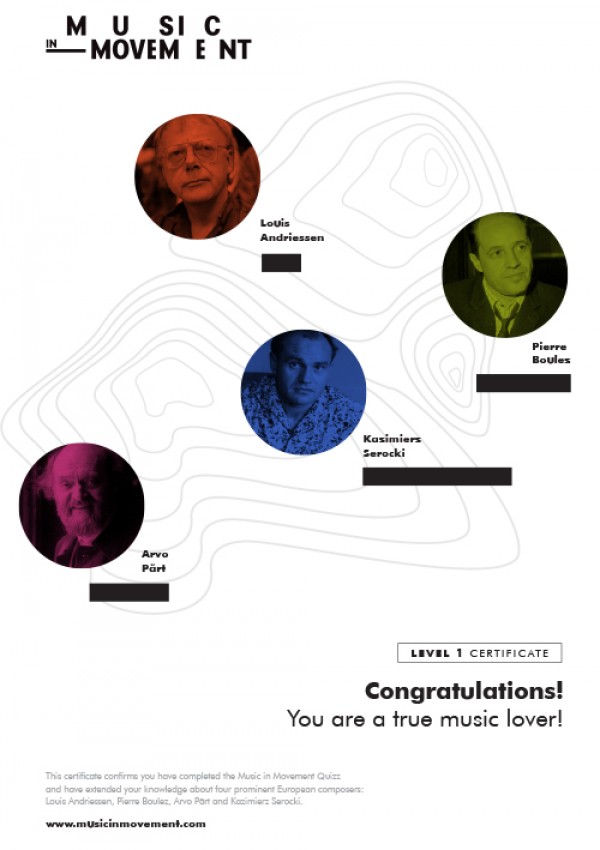MiM quiz – Expert level / Education
Remember, this quiz is not about testing your knowledge about contemporary music. It's all about getting to know the four composers - their music, techniques, but also inspirations and private stories. We invite you to take on this challenge - discover the universe of four personalities and dive in into their music.
20th- and 21st-century composers would often explain their composition techniques and engage in more general theoretical reflections
Many published books or articles; some conducted lectures at universities or courses, sometimes also commented on their works during encounters with non-expert audiences. But there were also those who did not comment on their oeuvres, assuming that music spoke for itself.
He published many books on music written by himself and other composers (especially 20th-century composers). In addition to educational and theoretical work addressed to specialists (composers, musicians, theorists), he devoted a lot of attention to providing comments on contemporary works for concertgoers, including young people.
He lectured in composition at conservatories and courses for young composers. He wrote one book – but he did not devote it to his own oeuvre but to the music of a composer that was artistically particularly close to him.
He did not give interviews and was reluctant to comment on his own oeuvre. He included his reflections on the foundations of his music in several hitherto unpublished lectures.
He did not write about his own music, but in interviews and numerous contributions on various occasions he said a lot about it.
Figures (from outside the world of music) important to the four composers:
Match the figure to a composer.
Kazimierz Serocki wrote music to Jerzy Hoffman’s Oscar-nominated film The Deluge.
In 1976, at the Wagner festival in Bayreuth, Pierre Boulez conducted Der Ring des Nibelungen in a production directed by Patrice Chéreau – to this day considered to be one of the best stagings of Wagner’s cycle.
The most popular and exemplary recordings of Arvo Pärt’s music have been issued by the ECM label headed by Manfred Eicher.
Peter Greenaway worked with Louis Andriessen on several musical-film and musical-stage projects (M is for Man, Music, Mozart; Rosa, Writing to Vermeer).
Creative periods - Pierre Boulez
Which work by the composer is earlier? Which is later?
The earlier one should be indicated.
Discreet use of live electronics (delay, reverb diversification) points to a later period of Pierre Boulez creations, associated with the IRCAM technology (Dialogue de l'ombre double, 1985). In the case of Le marteau sans maître (1954), the earlier date is indicated, inter alia, by the melody characteristic for the avant-garde of the 50s.
With whom did the four composers study?
Arvo Pärt studied composition in Tallinn with e.g. Veljo Tormis, a composer known primarily for his choral compositions.
The eminent Italian composer Luciano Berio was young Louis Andriessen’s composition professor in 1962–1964.
In the same period, also in Paris, Olivier Messiaen conducted his famous analysis class – his broad horizons, unconventional interests and openness attracted many composers, including Pierre Boulez, who several years later became leading figures of the European avant-garde.
Nadia Boulanger (1887–1979) was a teacher of many outstanding composers, including Kazimierz Serocki, who in 1947–1948 explored the secrets of composing under her guidance thanks to a scholarship he had been granted.
Well done!
We hope you enjoyed the experience!
You can now share & save your MiM certificate!

